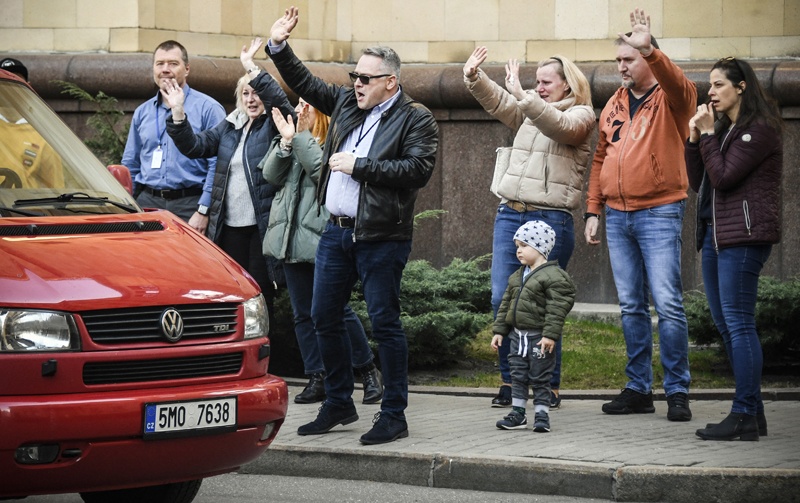 MOSCOW: Czech diplomats and their family members leave the grounds of the country's embassy in Moscow yesterday. - AFP
MOSCOW: Czech diplomats and their family members leave the grounds of the country's embassy in Moscow yesterday. - AFPMOSCOW: Russia's penitentiary service yesterday said it was transferring ailing Kremlin critic Alexei Navalny to prison hospital, as the EU warned it would hold Moscow "responsible" for the state of his health. The United States on Sunday threatened Russia with "consequences" if President Vladimir Putin's major domestic opponent-who launched a hunger strike three weeks ago-dies in jail, with Navalny's private doctors warning at the weekend he could pass away at "any minute".
Russia's prison authorities, which have barred Navalny's own medical team from visiting him, said its doctors had decided to move him to a medical facility on the premises of another penal colony outside Moscow. But the authorities insisted the anti-corruption campaigner's condition was "satisfactory", and said he was taking vitamin supplements as part of medical treatment.
Fears over Navalny's fate have added more fuel to soaring tensions between Moscow and the West over a build-up of Russian troops along the border with Ukraine and a spiraling diplomatic row with EU member state the Czech Republic. EU foreign policy chief Josep Borrell said the bloc held the Russian authorities "responsible for the health situation of Mr Navalny" as foreign ministers from its 27 nations held virtual talks.
Borrell called Navalny's condition "very worrisome" and repeated demands that Moscow allows his chosen team of doctors to inspect him. Lithuania's Foreign Minister Gabrielius Landsbergis pushed further, saying the bloc should prepare "a humanitarian mission" to fly him out of Russia for treatment. "If the international community does not respond, the regime's opposition leader will be sent silently to his death," Landsbergis said. The Kremlin dismissed the outcry from foreign leaders over Navalny's condition. "The health of convicts in the Russia Federation cannot and should not be a topic concerning them," said Putin's spokesman Dmitry Peskov.
Navalny, 44, was arrested in Russia in January after returning from treatment in Germany for a near-fatal nerve agent poisoning he says was carried out by Moscow-accusations denied by Putin's administration. Sentenced to two-and-a-half years in prison for embezzlement, he began a hunger strike on March 31 demanding medical treatment for back pain and numbness to his hands and legs.
The EU in October sanctioned six Russian officials over the Novichok nerve agent attack on Navalny, and in February sanctioned another four individuals over his arrest and sentencing. France's Foreign Minister Jean-Yves Le Drian said Sunday that those sanctions could be expanded. Navalny's supporters have called for a major protest across Russia on Wednesday to demand his release, hours after a state-of-the-nation address by Putin. Russian police-who detained thousands during earlier protests over Navalny's jailing-warned people not to demonstrate, saying officers would take "all necessary measures to maintain law and order".
Meanwhile, the Kremlin yesterday denounced the "provocative and unfriendly" expulsion of 18 Russian diplomats from the Czech Republic who were accused by authorities in Prague of spying. "We categorically do not agree with these conclusions," Kremlin spokesman Dmitry Peskov told reporters, describing the Czech move as "provocative and unfriendly". Czech authorities on Saturday said they would expel the diplomats identified by local intelligence as secret agents of Russian security services who are suspected of involvement in a 2014 blast that killed two people.
Russia responded on Sunday by announcing 20 employees of the Czech embassy in Moscow "persona non grata" and saying they had to leave the country before the end of yesterday. The expulsions were announced after the Czech ambassador in Moscow, Vitezslav Pivonka, had been summoned by the Russian foreign ministry. Also yesterday, the ministry's spokeswoman Maria Zakharova said that the "hastily fabricated" accusations were aimed at distracting from "accumulated problems in EU countries and in the West in general". - AFP









